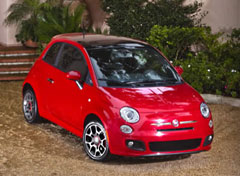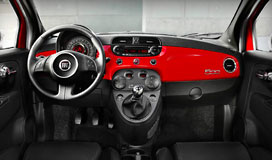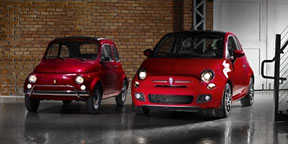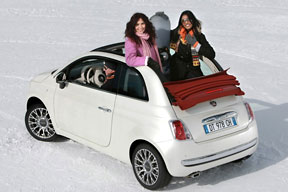I consider my interest in automobiles to be in continuum with my
interest in computers and tech. Not only because most cars these days
support some sort of integration with iPods - and on certain high-end
iron iPads as well - but also because they themselves are controlled by
computers, without which modern, fuel-mileage and emissions optimized
engines wouldn't even run, to say nothing of hybrids and electric
vehicles which are even more dependent on computers.
Cars and computers also share the status of being lifestyle
technologies, their use intricately woven into the fabric of our day to
day existence, and without which a great many of us would find
difficulty getting along.
Moore's 1962 Riley 1.5
I'm also a longtime fan of very small, efficient cars, from way back
before the days when fuel economy was a major concern, at least in
North America. I've actually only owned a couple of really small cars
myself over the past 45 years or so (I like big cars too) - notably a
1962 Volkswagen Beetle
and a 1962 Riley 1.5, the
latter which was essentially a British factory hot rod composed of a
substantially duded up Morris Minor chassis,
body, and interior with an MGA engine shoehorned in. That Riley was
ample proof that small cars don't have to be boring or slow.
I also drove Minis a lot back in the day (the original ten-foot-long
British motors Minis - not today's not-so-mini BMW Mini) belonging to
family and friends, as well as another friend's Renault 4.
These days, subcompact cars make more sense than ever. I'm not wild
about the aesthetics or the prices of most thematic replica cars like
the Mini and the new (also coming soon: newer) VW beetle, but the
Fiat 500
(Cinquecento, pronounced "chin-kwe-CHEN-toh") is another matter,
being a much more faithful tribute to its 54-year-old inspiration (in
production between between 1957 and 1975) than the British-Teutonic
replica or caricatures.
The Cinquecento redivivus captures the spirit and brio of its
mid-20th-century namesake, even though it's a completely modern - and
in some respects bleeding edge (more on this in a moment) - design with
a front rather than rear engine. And now, after an absence of more than
two decades, Fiats have
finally returned to North America, thanks to the Italian firm taking
control of Chrysler. Fiat's (and Chrysler's) Italian-Canadian CEO
Sergio Marchionne commented to the trade weekly Automotive News: "I am
convinced that the 500 with a full range [of body styles] will be a
smash [in the US] if we do it right."
They have. The first Cinquecentos arrived in my neck of the woods
just this week, and they are extremely cool little cars.
Part of doing it right is pricing it right, and the Fiat 500, which
comes in three trim levels (Pop, Sport, and Lounge), starts in the US
at $15,500 and in Canada at Can$15,995, which is substantially less
than the entry-level price points for the BMW Mini or the
just-redesigned VW New Beetle.
The North American version of the Fiat 500 is built in Mexico, and
compared with the European edition it has an increased fuel tank
capacity of 10.5 US gallons, a beefed up heating and cooling system,
newly designed seats, new steering wheel controls and a recalibrated
steering effort, and an available new 6-speed automatic gearbox, as
well as a Microsoft-developed Blue&Me handsfree
communication system and a USB port for device connectivity. All North
American Cinquecentos come with a 1.4 liter four-cylinder "MultiAir"
gasoline engine developing 101 HP (75 kW) at 6500 rpm and 133 Nm of
torque at 4000 rpm - roughly three times the displacement and eight
times more horsepower than owners got with the 1950s Cinquecento's
479cc two-cylinder, air-cooled, rear-mounted mill that generated a
whopping 13HP.
 You can still
get a two-cylinder 2012 Cinquecento in Europe, but it's now one of the
most technologically-advanced automobile engines in the world, a
water-cooled 875cc unit rated at 85 HP and a truly impressive 145Nm of
torque (more than the much larger four-cylinder North American
version's engine develops, and at a usefully low 1900 rpm, too). This
two-cylinder "Twin Air" powerplant also emits only 92g/km of
CO2, making it the world's least greenhouse gas polluting
non-hybrid gasoline engined four-seat vehicle, as well as delivering
excellent fuel-mileage along with very respectable, albeit not
pavement-ripping, 0-60 mph acceleration under 11 seconds and a top
speed of 108 mph. The Twin Air engine's impressive performance is
largely attributable to Fiat's electro-hydraulic variable valve
actuation technology, which opens the inlet valves by the optimum
amount in any circumstance. You can find a cool four-minute YouTube video that explains
it online.
You can still
get a two-cylinder 2012 Cinquecento in Europe, but it's now one of the
most technologically-advanced automobile engines in the world, a
water-cooled 875cc unit rated at 85 HP and a truly impressive 145Nm of
torque (more than the much larger four-cylinder North American
version's engine develops, and at a usefully low 1900 rpm, too). This
two-cylinder "Twin Air" powerplant also emits only 92g/km of
CO2, making it the world's least greenhouse gas polluting
non-hybrid gasoline engined four-seat vehicle, as well as delivering
excellent fuel-mileage along with very respectable, albeit not
pavement-ripping, 0-60 mph acceleration under 11 seconds and a top
speed of 108 mph. The Twin Air engine's impressive performance is
largely attributable to Fiat's electro-hydraulic variable valve
actuation technology, which opens the inlet valves by the optimum
amount in any circumstance. You can find a cool four-minute YouTube video that explains
it online.
This is advanced design of the sort one expects from the company
that makes Ferrari supercars and Maserati and Alfa Romeo high-end
sports cars at the other end of the price spectrum.
 Something else one expects in Italian cars is great, stylish
interiors. Automotive interiors are a category where countries of
origin tend to have distinct character signatures. No one does
traditional luxurious elegance as well as the British. The Germans lean
toward superbly executed but often somewhat austere design, while the
French can often seem almost perversely strange and quirky with car
interiors, although that isn't always a bad thing. French cars are
among the most comfortable in the world and often interestingly
innovative as well.
Something else one expects in Italian cars is great, stylish
interiors. Automotive interiors are a category where countries of
origin tend to have distinct character signatures. No one does
traditional luxurious elegance as well as the British. The Germans lean
toward superbly executed but often somewhat austere design, while the
French can often seem almost perversely strange and quirky with car
interiors, although that isn't always a bad thing. French cars are
among the most comfortable in the world and often interestingly
innovative as well.
However, the Italians have the edge on style and execution. It's not
for nothing that automotive journalists have been waxing rhapsodic over
what Fiat has done with Chrysler Corporation interiors since taking
control of the company two years ago. And the Fiat 500 doesn't
disappoint in this department either.
Additionally, a sporty Cabrio version of the 500c is offered,
inspired by the original 1957 fabric roof Fiat 500, but with thoroughly
modern mechanicals and engineering under the classic-appearing
skin.
 Fiat
notes that the new Cinquecento was developed by the Centro Stile Fiat
design center using an IT industry-esque "open-source approach,"
continually evolving on the basis of input from users and enthusiasts.
While the 2012 500 is a very small car by current standards, being some
15 cm shorter than a contemporary Mini and 40 cm shorter a Ford Fiesta,
it's actually somewhat huge compared with the original 1957 to 1975
Cinquecento, as these pictures illustrate.Anyway, in my estimation the Fiat 500 is a
car that technically oriented folks can appreciate, which gets me to
thinking. From time to time over the past decade or so the
rumor mills have speculated about the potential for possibly
integrating the iPod, iPhone, and other Apple products into an Apple
branded automobile - the proverbial "iCar." There have been reports of
Steve Jobs having discussion with automobile company executives, and
even rumors about a secret Apple iCar skunk works department at
Cupertino, but nothing has ever come of any of it, at least that we
know of.
Fiat
notes that the new Cinquecento was developed by the Centro Stile Fiat
design center using an IT industry-esque "open-source approach,"
continually evolving on the basis of input from users and enthusiasts.
While the 2012 500 is a very small car by current standards, being some
15 cm shorter than a contemporary Mini and 40 cm shorter a Ford Fiesta,
it's actually somewhat huge compared with the original 1957 to 1975
Cinquecento, as these pictures illustrate.Anyway, in my estimation the Fiat 500 is a
car that technically oriented folks can appreciate, which gets me to
thinking. From time to time over the past decade or so the
rumor mills have speculated about the potential for possibly
integrating the iPod, iPhone, and other Apple products into an Apple
branded automobile - the proverbial "iCar." There have been reports of
Steve Jobs having discussion with automobile company executives, and
even rumors about a secret Apple iCar skunk works department at
Cupertino, but nothing has ever come of any of it, at least that we
know of.
 However, it occurs that the Fiat 500 would seem to be an ideal
base for an iCar treatment. it has an understated but quietly cool and
stylish elegance about it that would harmonize well's with Apple
products. As I noted above, the differences among the Fiat 500 models
offered for sale in North America are essentially different trim
packages, so why not a fourth one; a Fiat 500 iCar joining the Fiat 500
Pop, Sport, and Lounge models? Just saying.
However, it occurs that the Fiat 500 would seem to be an ideal
base for an iCar treatment. it has an understated but quietly cool and
stylish elegance about it that would harmonize well's with Apple
products. As I noted above, the differences among the Fiat 500 models
offered for sale in North America are essentially different trim
packages, so why not a fourth one; a Fiat 500 iCar joining the Fiat 500
Pop, Sport, and Lounge models? Just saying.
A
Cinquecento-based, Apple cobranded iCar would have the
contemporaneously appropriate characteristics of small size and light
environmental footprint, which, combined with the Apple "i-factor"
could conceivably make it the iPhone/iPod/iPad of the automotive
world.
Sergio Marchionne evidently has a sense of stylish unconventionality
that would be compatible with Apple culture, a strong interest in the
music business sitting on the him boards of Vivendi and Sony Music with
one journalist reporting his office at Chrysler is "cluttered" with
hundreds of CDs stacked on the floor. He even has a partiality for
Steve Jobs-style black pullovers. (The Register recently
reviewed a European spec TwinAir Fiat 500.)
On the other hand, Marchionne is said to carry a backpack containing
six Blackberry smartphones (which he reportedly calls "divine
instruments") - one for each corporation he manages. Something would
have to be done about that!
A flight of fantasy, but it's fun. Ciao!

 You can still
get a two-cylinder 2012 Cinquecento in Europe, but it's now one of the
most technologically-advanced automobile engines in the world, a
water-cooled 875cc unit rated at 85 HP and a truly impressive 145Nm of
torque (more than the much larger four-cylinder North American
version's engine develops, and at a usefully low 1900 rpm, too). This
two-cylinder "Twin Air" powerplant also emits only 92g/km of
CO2, making it the world's least greenhouse gas polluting
non-hybrid gasoline engined four-seat vehicle, as well as delivering
excellent fuel-mileage along with very respectable, albeit not
pavement-ripping, 0-60 mph acceleration under 11 seconds and a top
speed of 108 mph. The Twin Air engine's impressive performance is
largely attributable to Fiat's electro-hydraulic variable valve
actuation technology, which opens the inlet valves by the optimum
amount in any circumstance. You can find a cool
You can still
get a two-cylinder 2012 Cinquecento in Europe, but it's now one of the
most technologically-advanced automobile engines in the world, a
water-cooled 875cc unit rated at 85 HP and a truly impressive 145Nm of
torque (more than the much larger four-cylinder North American
version's engine develops, and at a usefully low 1900 rpm, too). This
two-cylinder "Twin Air" powerplant also emits only 92g/km of
CO2, making it the world's least greenhouse gas polluting
non-hybrid gasoline engined four-seat vehicle, as well as delivering
excellent fuel-mileage along with very respectable, albeit not
pavement-ripping, 0-60 mph acceleration under 11 seconds and a top
speed of 108 mph. The Twin Air engine's impressive performance is
largely attributable to Fiat's electro-hydraulic variable valve
actuation technology, which opens the inlet valves by the optimum
amount in any circumstance. You can find a cool  Something else one expects in Italian cars is great, stylish
interiors. Automotive interiors are a category where countries of
origin tend to have distinct character signatures. No one does
traditional luxurious elegance as well as the British. The Germans lean
toward superbly executed but often somewhat austere design, while the
French can often seem almost perversely strange and quirky with car
interiors, although that isn't always a bad thing. French cars are
among the most comfortable in the world and often interestingly
innovative as well.
Something else one expects in Italian cars is great, stylish
interiors. Automotive interiors are a category where countries of
origin tend to have distinct character signatures. No one does
traditional luxurious elegance as well as the British. The Germans lean
toward superbly executed but often somewhat austere design, while the
French can often seem almost perversely strange and quirky with car
interiors, although that isn't always a bad thing. French cars are
among the most comfortable in the world and often interestingly
innovative as well. Fiat
notes that the new Cinquecento was developed by the Centro Stile Fiat
design center using an IT industry-esque "open-source approach,"
continually evolving on the basis of input from users and enthusiasts.
While the 2012 500 is a very small car by current standards, being some
15 cm shorter than a contemporary Mini and 40 cm shorter a Ford Fiesta,
it's actually somewhat huge compared with the original 1957 to 1975
Cinquecento, as these pictures illustrate.Anyway, in my estimation the Fiat 500 is a
car that technically oriented folks can appreciate, which gets me to
thinking. From time to time over the past decade or so the
rumor mills have speculated about the potential for possibly
integrating the iPod, iPhone, and other Apple products into an Apple
branded automobile - the proverbial "iCar." There have been reports of
Steve Jobs having discussion with automobile company executives, and
even rumors about a secret Apple iCar skunk works department at
Cupertino, but nothing has ever come of any of it, at least that we
know of.
Fiat
notes that the new Cinquecento was developed by the Centro Stile Fiat
design center using an IT industry-esque "open-source approach,"
continually evolving on the basis of input from users and enthusiasts.
While the 2012 500 is a very small car by current standards, being some
15 cm shorter than a contemporary Mini and 40 cm shorter a Ford Fiesta,
it's actually somewhat huge compared with the original 1957 to 1975
Cinquecento, as these pictures illustrate.Anyway, in my estimation the Fiat 500 is a
car that technically oriented folks can appreciate, which gets me to
thinking. From time to time over the past decade or so the
rumor mills have speculated about the potential for possibly
integrating the iPod, iPhone, and other Apple products into an Apple
branded automobile - the proverbial "iCar." There have been reports of
Steve Jobs having discussion with automobile company executives, and
even rumors about a secret Apple iCar skunk works department at
Cupertino, but nothing has ever come of any of it, at least that we
know of. However, it occurs that the Fiat 500 would seem to be an ideal
base for an iCar treatment. it has an understated but quietly cool and
stylish elegance about it that would harmonize well's with Apple
products. As I noted above, the differences among the Fiat 500 models
offered for sale in North America are essentially different trim
packages, so why not a fourth one; a Fiat 500 iCar joining the Fiat 500
Pop, Sport, and Lounge models? Just saying.
However, it occurs that the Fiat 500 would seem to be an ideal
base for an iCar treatment. it has an understated but quietly cool and
stylish elegance about it that would harmonize well's with Apple
products. As I noted above, the differences among the Fiat 500 models
offered for sale in North America are essentially different trim
packages, so why not a fourth one; a Fiat 500 iCar joining the Fiat 500
Pop, Sport, and Lounge models? Just saying.
